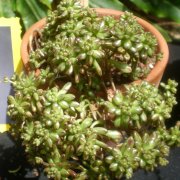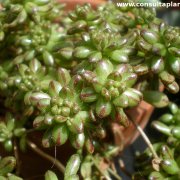Care of the succulent plant Aeonium sedifolium or Dwarf Aeonium |
|
The genus Aeonium, of the Crassulaceae family, comprises 75 species of succulent plants native to the Canary Islands, Madeira, East Africa and Morocco. Some species are: Aeonium percarneum, Aeonium mascaense, Aeonium haworthii, Aeonium glutinosum, Aeonium canariense, Aeonium arboreum, Aeonium undulatum, Aeonium spathulatum, Aeonium sedifolium, Aeonium virgineum, Aeonium hierrense. Common name: Dwarf Aeonium. This species is native to Canary Islands. They are succulent plants of compact, branched and shrubby habit that reach 40 cm (1.31 feet) in height. They have fleshy sticky leaves that are bright green with reddish lines. They produce small yellow flowers in inflorescences that emerge above the leaves. They bloom in spring. Due to its small size Dwarf Aeonium is usually used in pots as a houseplant, greenhouse or in patios and terraces. They are suitable for rockery in frost-free regions. Aeonium sedifolium prefers a semi-shade exposure avoiding direct sunlight in the middle of the day. Although it can withstand an occasional frost of up to about -2 ºC (28.4 ºF) it is better that in winter it does not suffer temperatures below 4 ºC (39.2 ºF). We can use a commercial cactus substrate as soil by adding a little thick siliceous sand. The pot transplant should be done at the beginning of spring. You always have to wait for the soil to dry well before watering as they resist drought well. In summer they enter into rest so they will be watered moderately and in winter one irrigation will suffice every month. Fertilizing with cactus mineral fertilizer in early spring is sufficient. Dwarf Aeonium is pruned only to remove damaged branches or to make cuttings. Aeonium sedifolium can suffer from fungal problems if there is excess moisture. The fastest and easiest way to propagate is from cuttings taken in spring or early summer. |
Images of the succulent plant Aeonium sedifolium or Dwarf Aeonium |
Find plants
Aeonium sedifolium or Dwarf Aeonium | Care and Growing
© 2026 FavThemes

